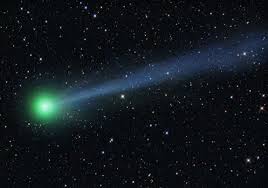记忆方法
记忆“comet”可以将其分解为“co”和“met”。想象自己(me)和一群星星(stars)在“co”一起飞,最终“met”到一颗彗星。这个“飞”的动作可以帮助你记住“comet”是一种流星体的形态。
以上内容由AI生成, 仅供参考和借鉴
中文词源
comet 扫帚星
来自拉丁词cometa, 长发。因形如拖着的长头发而得名。
英语词源
- comet
-
comet: [13] Comet means literally ‘the longhaired one’. Greek kómē meant ‘hair’, but it was also applied metaphorically to the tail of a comet, which was thought of as streaming out behind like a luxuriant head of hair being blown by the wind. Hence an astēr kométēs ‘longhaired star’ was the name given to a comet. Eventually the adjective kométēs came to stand for the whole phrase, and it passed via Latin comēta and Old French comete into English.
- comet (n.)
- c. 1200, from Old French comete (12c., Modern French comète), from Latin cometa, from Greek (aster) kometes, literally "long-haired (star)," from kome "hair of the head" (compare koman "let the hair grow long"), which is of unknown origin. So called from resemblance of a comet's tail to streaming hair.
权威例句
- 1. They observed the comet for 70 days before it faded from sight.
- 他们观察了这颗彗星70天,直至其慢慢从视线中消失。
- 2. Comet also sired the champion foal out of Spinway Harvest.
- “彗星”还跟“斯平威·哈维斯特”生下了这匹出类拔萃的小马驹。
- 3. We were not altogether sure that the comet would miss the Earth.
- 我们不能完全肯定彗星不会与地球相撞。
- 4. The orbit of this comet intersects the orbit of the Earth.
- 这颗彗星的轨道与地球的轨道交叉。
- 5. Recently they have discovered a comet.
- 最近他们发现了一颗彗星.
